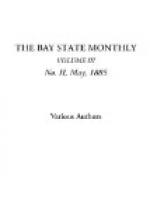When, after the Garrison riot, Mr. Garrison issued his appeal to the citizens of Boston, Angelina’s anti-slavery enthusiasm was fully aroused. On the 30th of March of that year (1835) she wrote a letter to Mr. Garrison,—as brave a letter as was ever penned by the hand of woman. In it occur these thrilling words:—
If, she says, persecution is the means which God has ordained for the accomplishment of this great end, Emancipation, then, in dependence upon him for strength to bear it, I feel as if I could say, Let It Come! for it is my deep, solemn, deliberate conviction that this is a cause worth dying for. I say so from what I have seen, heard, and known in a land of slavery, where rests the darkness of Egypt, and where is found the sin of Sodom. Yes! Let it come—let us suffer, rather than insurrections should arise.
Mr. Garrison published the letter in the “Liberator” to the surprise of Angelina and the great displeasure and grief of her Quaker friends, and of her sister, Sarah, as well. But Angelina was not dismayed. In 1836 she wrote her “Appeal to Southern Women,” and sent it to New York, where it was published as a pamphlet of thirty-six pages. Mr. Elizur Wright spoke of it, at the time, as “a patch of blue sky breaking through the storm-cloud of public indignation which had gathered so black over the handful of anti-slavery workers.” The praise was not exaggerated. The pamphlet produced the most profound sensation wherever it was read.
Soon after its publication the sisters went to New York and there openly identified themselves with the members of the American Anti-Slavery Society; and also of the Female Anti-Slavery Society. The account of the first assembly of women, not Quakers, in a public place in America, addressed by American women, as given in these pages, is deeply interesting and touching from its very simplicity. We, who are so accustomed to hear women speak to promiscuous audiences on any and every subject, will naturally smile at the following memoranda by Angelina:—




